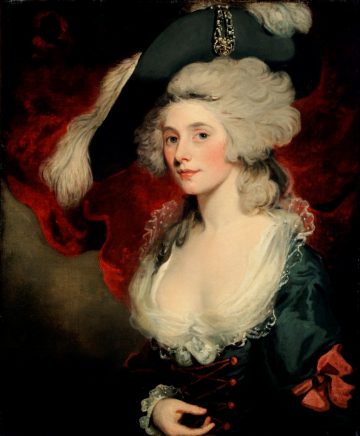

Author: Evance, Susan (dates uncertain; fl. 1808-18)
Title: Poems . . . Selected from her Earliest Productions, to Those of the Present Year.
Date: 1808
Descriptive Essay
In 1808, Susan Evance published her substantial collection, Poems, by Miss S. Evance, Selected from Her Earliest Productions, to Those of the Present Year. The collection begins with an “Advertisement” by the editor, James Clarke. Here, he writes, “If the satisfaction and pleasure I have enjoyed in the perusal of these poems, shall, by their publication, be more generally diffused, I shall rejoice to have employed my influence in bringing them before the public.” He also talks about the tone of the poems included in the collection. Clarke does not leave the melancholy tone of Evance’s poems a surprise to the readers, but prepares the readers in advance by calling attention to “The melancholy strain of some pieces in the pieces in the following collection . . . this excess of feeling, though often highly interesting, ought to be seldom or never admitted.”
Indeed, melancholy does color many of Evance’s poems. In her “Sonnet to Melancholy,” for example, Evance revels in her sadness.
When wintry tempests agitate the deep,
On some lone rock I love to sit reclin’d;
And view the sea-birds on wild pinions sweep,
And hear the roaring of the stormy wind,
That, rushing thro’ the caves with hollow sound,
Seems like the voices of those viewless forms
Which hover wrapp’d in gloomy mist around,
Directing in their course the rolling storms,
Then, Melancholy! Thy sweet power I feel,
For there thine influence reigns o’er all the scene;
Then o’er my heart thy “mystic transports” steal,
And from each trifling thought my bosom wean.
My raptur’d spirit soars on wing sublime
Beyond the narrow bounds of space and time!
We see Evance reveling in her sadness when she says “Then, Melancholy! Thy sweet power I feel.” This line suggests to the reader that the poet is using her sadness as a muse, invoking its “power” to help her see the world and write about it. She is definitely a poet who uses her sadness to her advantage, because her sad melancholy is brought up time and time again throughout the collection.
Evance even involves her sense of sadness and melancholy when she is writing nature poems. While in the modern world we might think of nature poems as very peaceful and not particularly sad, but Evance, like many other Romantic Era poets, often put the two together. Her collection includes countless sonnets and poems dedicated to nature, like “Sonnet to Autumn,” “Sonnet to a Violet,” and “Sonnet to the Clouds.” All of these poems are grounded in imagery of nature. For example, in “Sonnet to a Cloud,” Evance writes,
I love to view you, when the glimmering ray
Of early morning tints your forms so pale,
Or when meek twilight gleams above the steep...
Evance easily displays her love for the world, for Earth, and for nature in that poem. She uses the sky in this case, instead of a flower, but she asks her reader, what is the world without the sun and moon? We can gather that she especially loves evening, so it is of no surprise that she includes images of twilight in this poem, just as she does also in “To Twilight”.
Images of twilight appear often in Evance’s poems, as do images of other aspects of nature like animals and flowers. She is often captivated by natural things that might not be the usual subjects, like humble little flowers, and, again, night and the darker, sadder and more somber side of nature.
The forms of her poems are also similar. She often writes sonnets, though she does have occasionally long poems, like “A Cottage Scene”. But most of the time, she sticks to the strict form of a sonnet.
In addition to writing about nature and melancholy poems, Evance al;so writes about people. For example, there is a poem titled, “To Miss Barton,” in which Evance is writing a farewell to what appears to be a friend who is dying or has died. She writes,
Thy last farewell of love is mine-‑
Maria! Oh -- adieu.
Prepar’d as thou art to depart,
I should not wish thy stay;
Be still, my weak, my throbbing heart!
Ye tears -- away, away.
In this passage, we are able to see her exploit her profound sadness and make it real and visible to readers when she says, “Be still, my weak, my throbbing heart!” Passgaes like these strikes her reader with her pain because she is able to describe things in such a way that makes us listen, see, and feel. This kind of affecting poem, again, is not uncommon in what the collection suggests that Evance usually writes. A master of the melancholy tone, she proves herself a master at writing poems of farewell to those whom she loved.
Because this collection covers a range of years, we are able to trace in its many poems the evolution of Evance’s obsessions: nature, melancholy, and poems for the people she loves. These three main themes are prevalent throughout this collection. Sadly, she appears to have had only one other major publication, A Poem Occasioned by the Cessation of Public Mourning for Her Royal Highness, the Princess Charlotte, which was published in 1818, shortly after the unexpected death in childbirth of the Prince Regent’s daughter and only child. Other than that, along with a small quantity of incidental information that may be inferred from her poems themselves, very little else is known of Evance, and therefore, over the years, she and her work have been largely forgotten.
Prepared by Samantha Stuefer, University of Nebraska, April 2018.
© Samantha Stuefer, 2018.